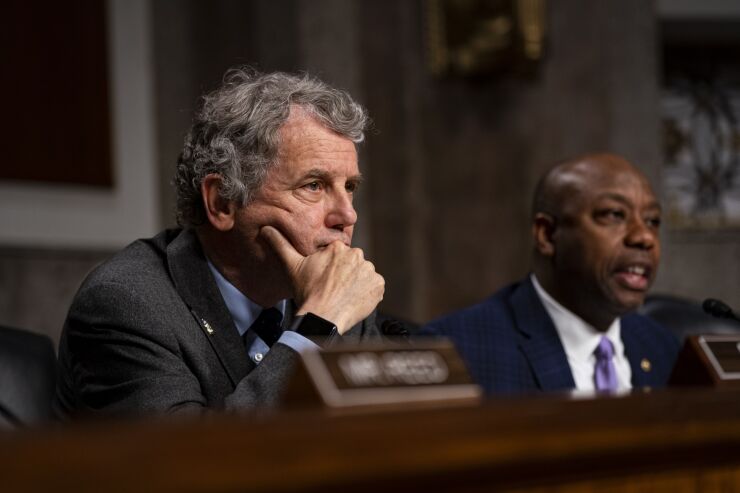
WASHINGTON — In a short hearing in front of the Senate Banking Committee, lawmakers discussed
Leading lawmakers of both parties qualified the conversation by saying that the panel would consider what changes, "if any," should be made to the deposit insurance system in the wake of the failures of three large regional banks, including Silicon Valley Bank, which had an unusually high share of uninsured deposits. That's a shift from the early days of the regional bank turmoil, when discussions of deposit insurance reform
"The purpose of today's hearing is to understand whether our current federal deposit insurance framework continues to fulfill that promise," said Sen. Sherrod Brown, D-Ohio, the chairman of the Senate Banking Committee. "Our panelists come from diverse backgrounds and present unique perspectives on what changes, if any, should be made."
The panel's ranking member, Sen. Tim Scott, R-S.C., who is making his own presidential bid in 2024, gave even more cautious remarks.
"It's not an understatement to say that deposit insurance is a complex issue that deserves a thorough evaluation," he said. "And what legislative response may be necessary — if any — because when it comes to proposals for reform to the system, there are a number of tradeoffs we must consider. And frankly, even scrutinize."
Sen. Mark Warner, D-Va., was more direct.
"It feels to me like a lot of the energy around the FDIC in terms of reform has kind of dissipated a little bit," he said.
Sen. J.D. Vance, R-Ohio, introduced a bill before the committee's hearing called the Payroll Account Guarantee Act that would increase deposit for noninterest-bearing business transaction accounts. Vance has yet to garner support for that bill, however, among other lawmakers on the committee.
"The idea is that if you have a few million dollars that comes in at the end of the day and accounts receivable in your bank collapses, you're not penalized for this," Vance said. "You're not, you know, in other words, we're not penalizing businesses for using a bank as a bank."
To be sure, appetite remains for some kind of legislative action after this spring's bank failures, particularly around executive compensation and in the role technology is increasingly playing in the banking system.
"The bank run that was created in part by social media is something obviously we've never seen before," Scott said. "I'd love for us to contemplate what types of changes are necessary because of the technological evolution that we're seeing in the space, and how we're trying to insulate our financial system going forward."






